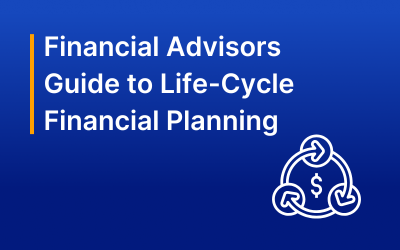While the role of a financial advisor may have come into existence to help people and businesses manage their investments, it’s evolved into so much more than that.
Advisors are now tasked with guiding clients through every stage of their financial journey — from young adulthood through retirement — which is where life-cycle financial planning comes into play.
This approach recognizes clients’ financial needs and goals over time and helps financial advisors create long-term strategies that adjust as clients move through different life stages.
By focusing on the entire financial life cycle, advisors can provide more personalized and effective guidance, ultimately creating more meaningful relationships with their clients.
Understanding the Financial Life Cycle Stages
The financial life cycle is a structured approach that allows advisors to align their strategies with clients’ changing priorities over time. By breaking the financial planning life cycle into five distinct stages — formative years, early career, mid-career, pre-retirement, and retirement — advisors can anticipate needs and provide proactive, relevant guidance.
Because each stage comes with its own set of challenges and opportunities, life cycle financial planningis alsoa valuable tool in delivering personalized advice.
Why does it matter? Because financial priorities change as people age.
In early adulthood, clients may focus on paying off debt and starting to invest, while in mid-career, they may concentrate on building wealth and saving for retirement. As they near retirement, strategies for maximizing savings, reducing taxes, and preparing for healthcare become more important.
Life cycle planning ensures that clients are on the right path at each stage and remain financially secure as their circumstances evolve.
Formative Years (Ages 13-17)
The formative years mark the beginning of an individual’s financial life. This phase often involves building a foundation of financial literacy, learning the importance of saving, and understanding basic financial principles.
Advisors play a pivotal role in helping parents set their children up for success, too.
Income Lab’s tools can assist advisors by modeling the long-term growth of early savings and investments, providing future projections that help parents plan for education funding and other expenses. By establishing disciplined savings habits early, individuals set themselves up for financial stability later in life.
Early Career (Ages 18-25)
The early career stage is typically when individuals begin to earn a steady income and face new financial challenges like managing student debt, establishing an emergency fund, and starting to invest. Financial advisors can help clients in this phase by providing debt management strategies, as well as developing savings and investment plans that align with their goals.
Income Lab’s interactive planning tools can be particularly helpful here, as they allow advisors to create customized plans that visualize debt repayment with early investments, giving clients a clear view of their financial future.
Mid-Career (Ages 26-45)
During the mid-career stage, individuals often focus on building wealth, managing a mortgage, and devising long-term investment strategies.
It’s also an important time for retirement preparation and risk management — a time when individuals should focus on maximizing their savings and protecting their financial future.
Some key ways to do so include increasing retirement contributions, diversifying investments, managing and reducing debt, and ensuring adequate insurance coverage for unexpected events. Long-term tax planning, such as Roth IRA conversions, also help, as they minimize future tax burdens, while regular assessments of retirement savings projections keep clients on track.
Using Income Lab’s Tax Lab tools, advisors can optimize planning strategies to ensure clients stay on track to meet their retirement goals. By adjusting plans as necessary, based on market conditions or life changes, advisors can also offer clients peace of mind as they navigate this important stage of the financial planning life cycle.
Pre-Retirement (Ages 46-64)
In the pre-retirement stage, clients typically focus on maximizing their retirement savings, developing tax-efficient investment strategies, and ensuring they have enough resources to maintain financial independence in retirement. Advisors can help clients fine-tune their retirement plans by ensuring their savings are aligned with future needs.
This is where Income Lab’s Retirement Stress Test comes into play. The tool allows advisors to assess various scenarios, ensuring clients are prepared for the challenges retirement might bring. The Stress Test enables advisors to walk their clients through their retirement income plan and show that while market shocks can certainly happen in retirement, they’ve been overcome in the past, such as during the Dot-Com Bubble and the Great Depression.
Because of this, the Retirement Stress Test can give clients peace of mind while helping advisors create strategies that maximize their income and minimize taxes and other risks.
Retirement (Ages 65+)
Once clients reach retirement, their focus shifts from saving to spending. Advisors can support clients by creating withdrawal strategies that ensure their funds last throughout retirement, as well as planning for healthcare expenses and long-term care.
Income Lab’s dynamic planning tools help financial advisors monitor and adjust plans in real-time, responding to clients’ changing needs and ensuring their retirement remains financially secure.
How Income Lab Supports Life-Cycle Financial Planning
Income Lab understands the value of life cycle financial planning. That’s why we offer financial advisors a suite of powerful tools that enhance their ability to guide clients through each stage of life. With features like dynamic planning, retirement stress testing, and tax-smart distribution strategies, Income Lab empowers advisors to provide data-driven advice that evolves with clients’ needs throughout their lifetime.
By taking advantage of Income Lab’s capabilities, advisors can create comprehensive financial plans that account for every stage of the financial planning life cycle, from the formative years through retirement.
Conclusion: Helping Clients Thrive at Every Life Cycle Stage
Life-cycle financial planning is important for any individual, at any stage of life. Using this approach, advisors can effectively guide their clients through the entirety of their financial journey, from early adulthood to retirement. In doing so, they help their clients achieve long-term financial security.
Income Lab is well-equipped to be your partner in this process. We offer powerful tools that help advisors to create plans in minutes compared to the hours other solutions offer, scenario plan for possible outcomes, and stress-test retirement scenarios, ensuring clients stay on track at every stage.
To see how Income Lab can enhance your approach to life-cycle financial planning, schedule a demo today.


